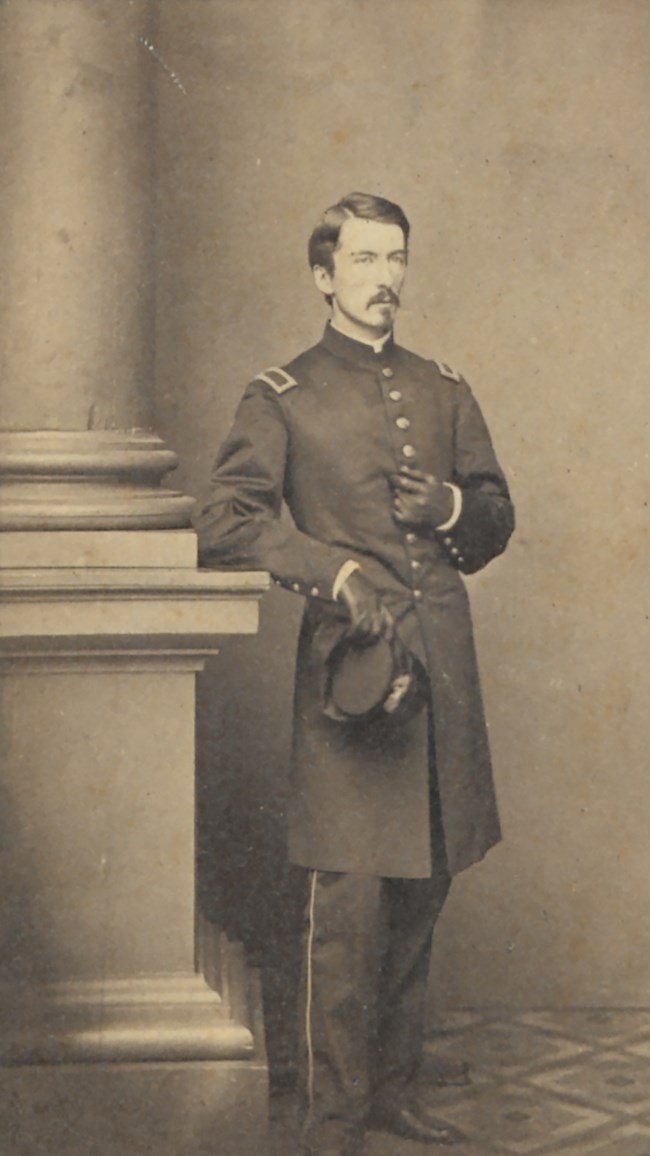Last updated: December 2, 2022
Article
Du Pont at Cedar Creek

Hagley Museum & Library
"The battle of Cedar Creek was by far the most momentous episode of my whole military career… it was my fortune to be most suddenly and unexpectedly called upon to act wholly upon my own responsibility as well as to make the instant decisions which… temporarily delayed the advance of [one] Confederate division but of the whole Confederate artillery at the very moment when both were most needed by the enemy. The time thus gained prevented the capture of a large number of officers and men...
I was only a few months over twenty-six at the time—an age which from my present viewpoint seems very youthful, but which I was far from considering as such in 1864. It was a great satisfaction to know that all the measures I had taken met with General Crook's entire approbation..."
Henry A. du Pont
Saving the Cannons
The first Confederate assault at Cedar Creek, October 19, 1864, struck the US Army's left wing, held by the 8th Corps, achieving complete surprise. The 8th Corps' entrenchments and camps were completely overrun, with many men being killed or captured in their tents, but Captain Henry A. du Pont saved two of his three batteries. Amid the confusion of battle, and a thick fog that blanketed the area, du Pont skillfully withdrew his cannons from a seemingly hopeless trap, and then used them in a fighting retreat with the rest of the army.
Artillery Supports the Federal Counterattack
By mid-morning, the Federal army had re-grouped north of Middletown and began to prepare a counterattack. That counterattack came at 4:00 p.m., with Capt. du Pont's batteries taking an active part in providing supporting fire to advancing Federal infantry lines, and later, assisting in the pursuit of the retreating and demoralized Confederate army. Henry du Pont had been active the entire day, from the pre-dawn Confederate attack, until darkness covered the final withdrawal of the Confederate forces.
Maj. Gen. George Crook, the 8th Corps commander, noted in his official report, "Captain Du Pont, chief of artillery, and the officers and men of his batteries are deserving of particular mention for their conspicuous gallantry and the valuable services rendered that day."
Late Developments
Du Pont recounted that later that evening,
"Night had now fallen and the battle was over... I was almost completely worn out mentally and physically... I had not tasted food for more than twenty-four hours… [and] had been almost continuously in the saddle since the Confederates attacked us between 4:30 and 5:00 o'clock in the morning... The only recourse was to seek food and shelter at the headquarters of my corps which were with Army Headquarters at the Belle Grove house. Upon arriving there, one of the first persons I met was General Torbert of Delaware, commander of our cavalry corps, who lost no time in telling me that General Ramseur was mortally wounded and lying in the house, which information so acutely shocked and distressed me that I forgot for the time my own necessities and hastened upstairs to see him.
Ramseur and I had been on terms of most friendly intimacy during the four years we served together at West Point, and although his own surgeon and adjutant-general were present, he turned to me in his suffering and never relinquished his grasp of my hand until the anesthetic given to relieve his agony had rendered him unconscious, which condition continued until the end came. My eventful day closed with this tragic incident…"
Ramseur, only 27, died the next morning, leaving his young wife a widow and his only daughter fatherless.
Medal of Honor
Thirty-four years later, in 1898, du Pont's actions at Cedar Creek were officially recognized when he received the nation's highest military honor, the Medal of Honor. The official citation reads,
"By his distinguished gallantry, and voluntary exposure to the enemy's fire at a critical moment, when the Federal line had been broken, encouraged his men to stand to their guns, checked the advance of the enemy, and brought off most of his pieces."
Henry du Pont continued his military service until 1875. He returned to Delaware where he served as the president and general manager of the Wilmington & Northern Railroad Company from 1879 to 1899. Du Pont was also twice elected to the United States Senate (1906-1917).
Du Pont Remembers Ramseur
Henry du Pont returned to Cedar Creek one last time to honor his old West Point classmate, Stephen Ramseur. Du Pont described Ramseur as "a close friend of my youthful days" and "held him in most affectionate remembrance..." On September 6, 1920, du Pont delivered the keynote address during the dedication ceremony to a monument erected in Ramseur's memory. Du Pont also recalled their last meeting, almost 56 years before.
"The room was absolutely still— Ramseur, clad in his major general's uniform, lay on his back in the bed, eyes closed... Approaching the bed I said, "Ramseur, do you know me?" mentioning my name; he opened his eyes, in which I saw recognition and apparently a gleam of pleasure... Speaking with the greatest effort he said to me: "Du Pont, you don't know how I suffer," and then relapsed into silence and closed his eyes— not, however, before extending his hand and firmly grasping and holding mine. I was deeply moved. Strange as it may seem—illogical, if you please, in that supreme moment he turned with content and satisfaction to the one person present who though officially a foe, was still, as he instinctively felt, the steadfast personal friend of former days!"
Ramseur’s monument is at the intersection of Belle Grove Road and Valley Pike, within sight of the house where the young general had died.
